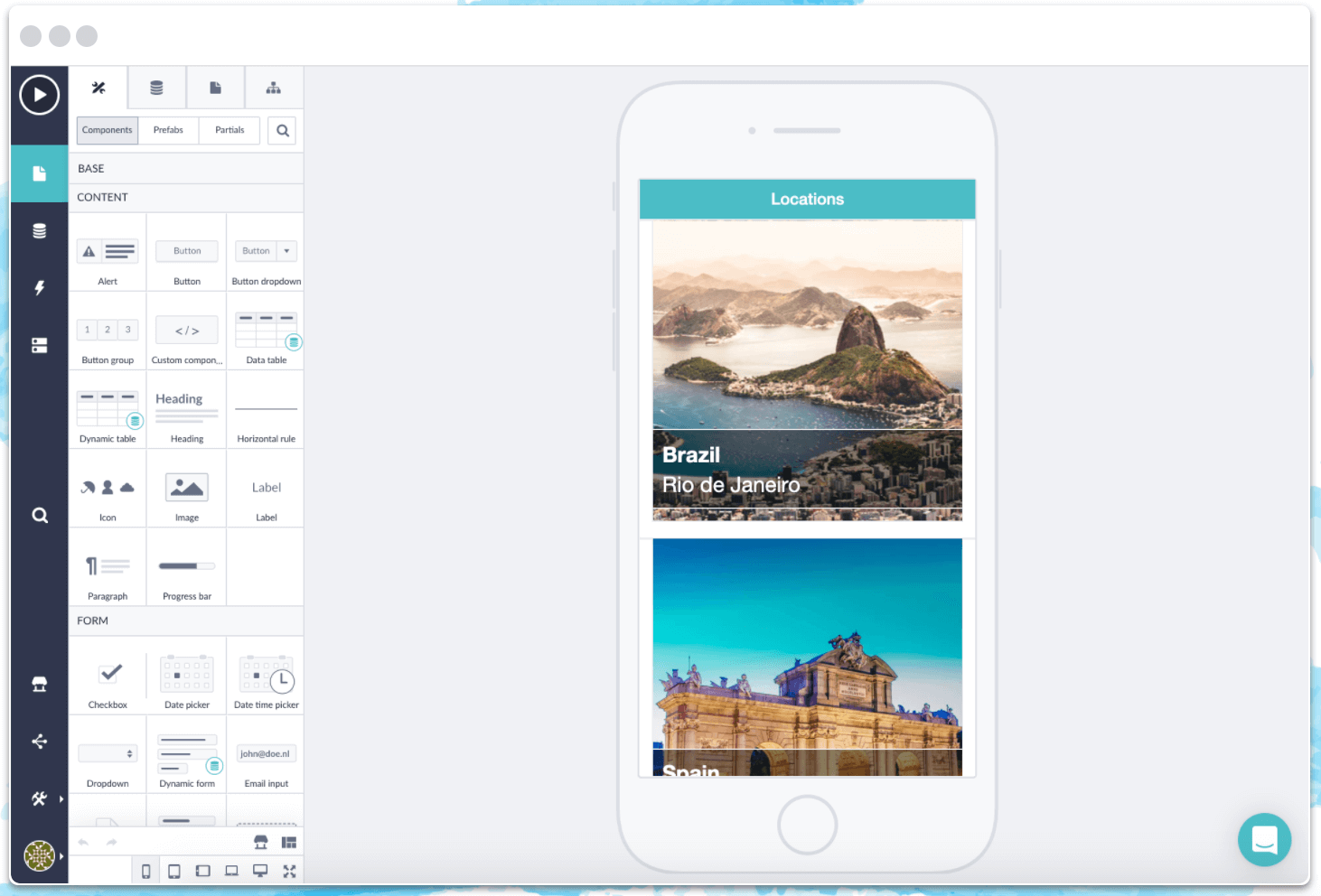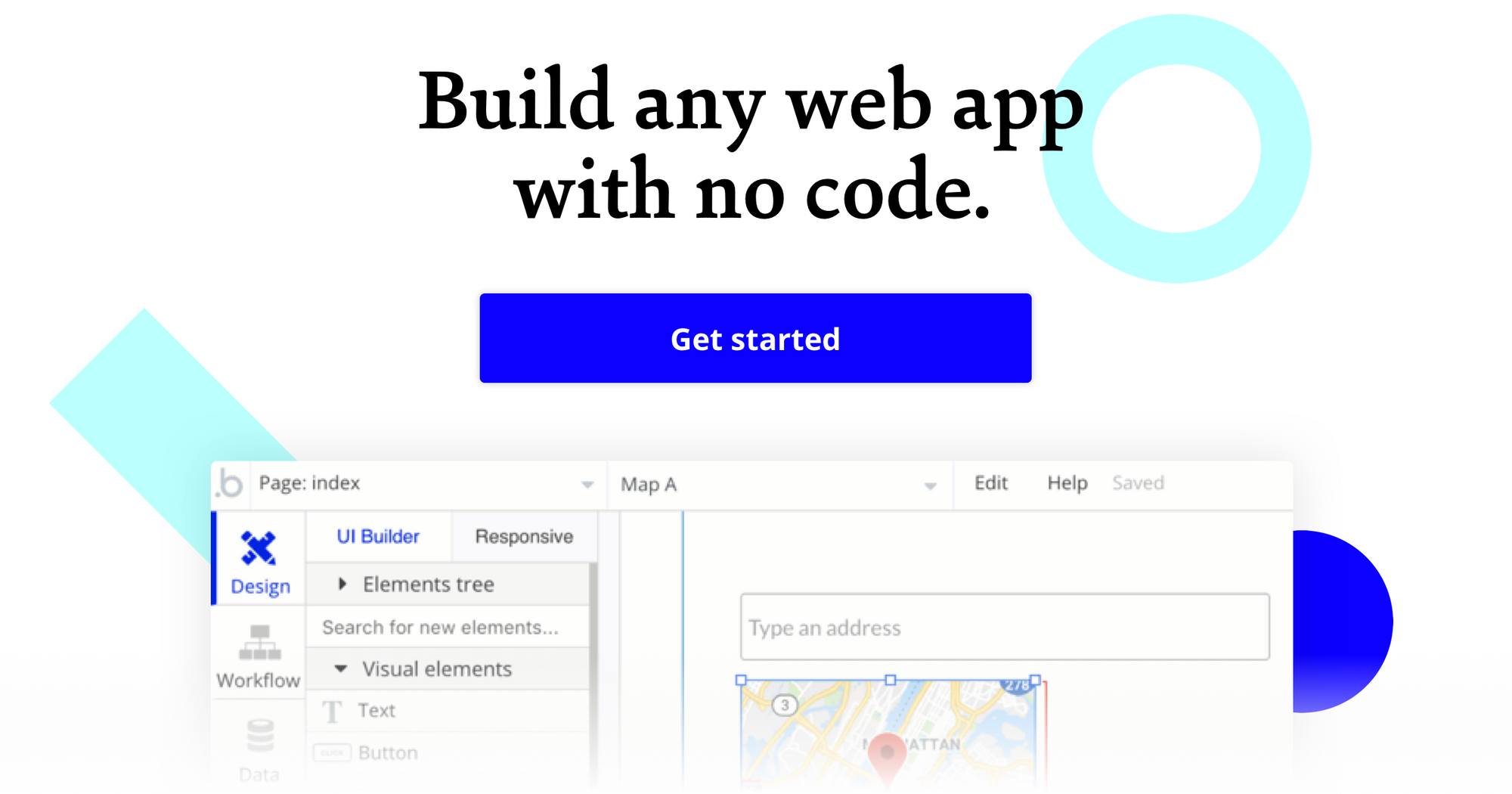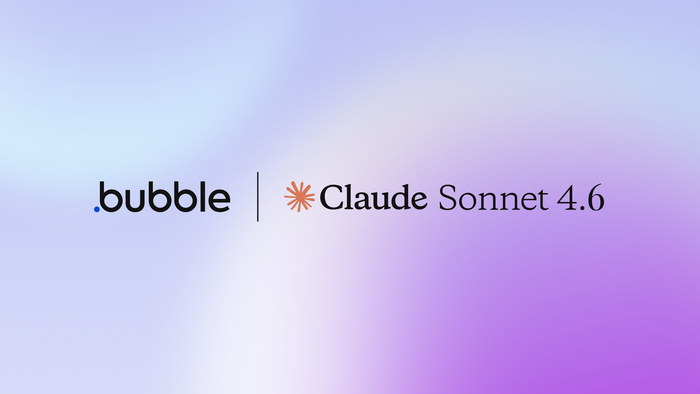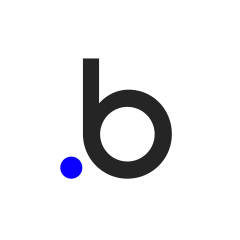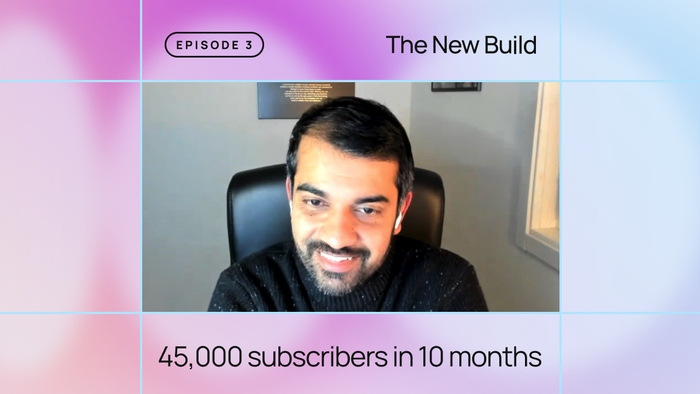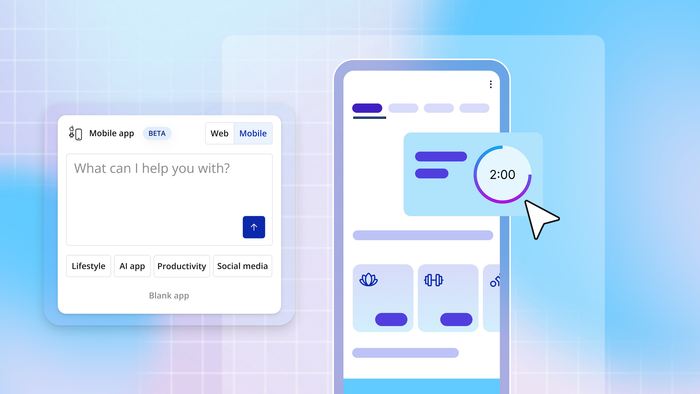At Bubble, we want to enable potential builders to create their ideas without code, so we are exploring and reviewing the many tools and software that enterprises might use to build apps.
What is Betty Blocks?
Betty Blocks is an enterprise-focused no-code tool that provides IT departments and “citizen developers” with a platform for companies’ workforces to build applications.
With Betty Blocks, you can build both web and native apps. Betty Blocks’s editor allows you to build your app in the browser of any device or operating system.
For front-end development, Betty Blocks offers a drag-and-drop editor that combines with any JavaScript framework. You can mix-and-match between Betty Blocks-made interfaces and HTML. While their front-end templates are not beautiful, their designs are consistent and allow for rapid development.
Betty Blocks enables your team to customize the app with third-party plugins. They offer third-party API integration with a number of tools and platforms, including Google Maps, Salesforce, Google Sheets, Slack, and Twitter.
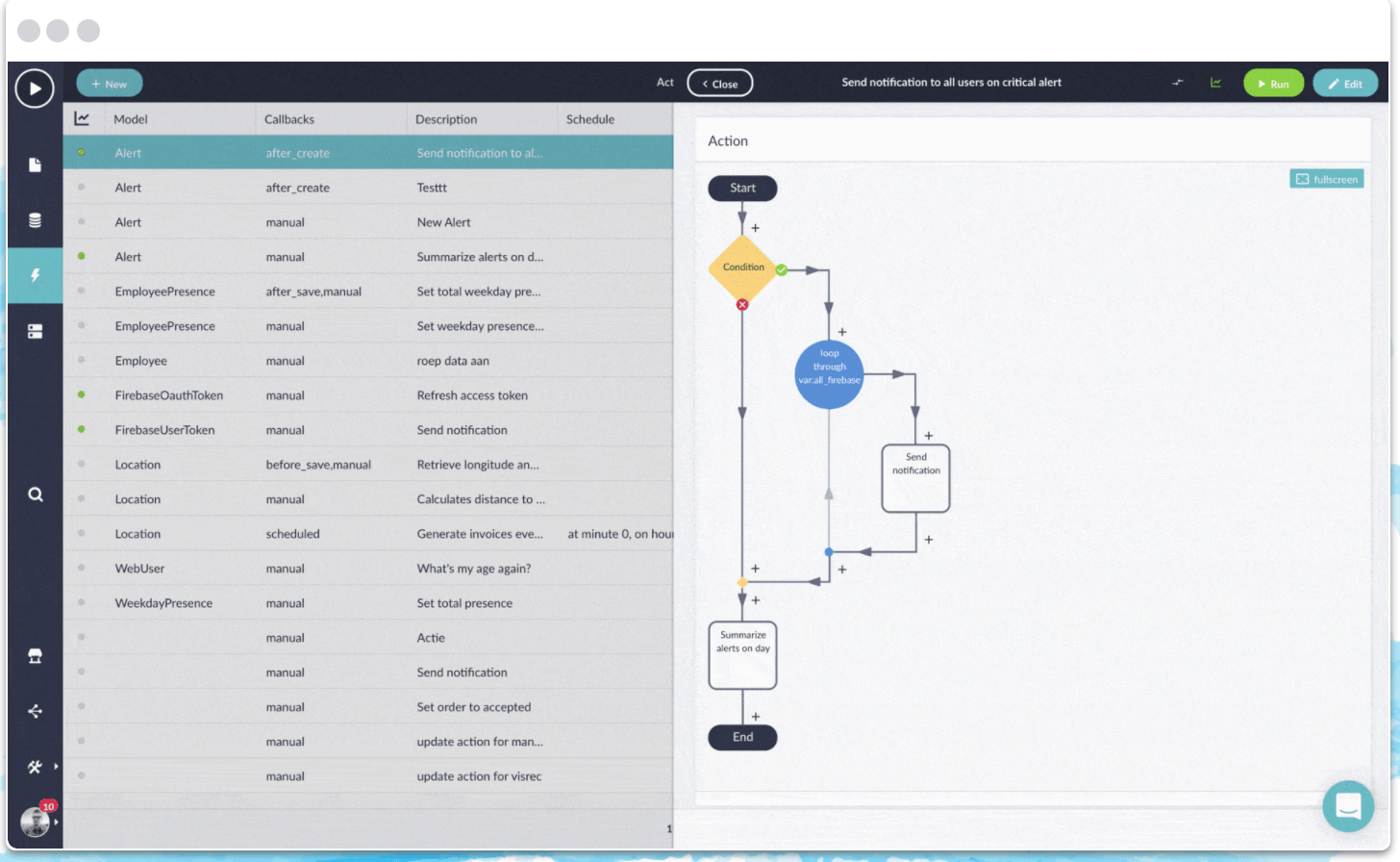
The no-code platform allows you to pick and choose from a variety of pre-made components, which are also referred to as blocks. Examples include models, actions, pages, and web services, as well as tools for generating customer quotes, making reservations, and scheduling meetings.
Who is Betty Blocks for?
Users of Betty Blocks include employees across a wide range of industries in the private and public sectors, including insurance, education, consulting, human resources, travel, IT, and healthcare.
Businesses and organizations that want to empower their employees to build complex applications without coding, and who want to radically shorten time-to-market, will benefit from building apps with Betty Blocks.
Betty Blocks Cost and Pricing?
(Pricing model evaluation: May 2020)
The Betty Blocks pricing system can get a bit unwieldy. You can choose from 2 packages (Starting or Enterprise), and each package has ten different tiers of pricing structure. Prices are contingent on signing a 3-year agreement and determined by the number of “blocks” that your company is using.
Both subscription plans include 10GB of storage, though 100GB of additional storage can be purchased for $830 per year. Companies that select the Starting and Enterprise Packages receive support from the Betty Blocks team throughout the development process, including the design and launch stages.
Both options come with “Tier 0” support, which includes web-based support and online service assistance that allows you to access the technical team from 9am-5pm on business days (excluding holidays).
Enterprises can pay extra for Tier 1, Tier 2, or Tier 3 support. These add-ons guarantee quicker response times from the Betty Blocks technical team, with more expensive plans coming with faster support. Those who want Tier 1, Tier 2, or Tier 3 support for the platform alone pay $550, $1650, and $2750 per month, while enterprises seeking support for both the platform and application pay $825, $2475, or $3850.
Starting Package: The Starting Package is a good option for enterprises that requires 1000 building blocks or fewer, with each block costing $165 per year.
Enterprise Package: If you are looking to build an app with 1001-3500 blocks, the Enterprise Package will meet your needs. The price per block (per year) is $154.
Betty Blocks vs. Bubble: A Comparison
How does Betty Blocks compare to Bubble?
Similarities between Betty Blocks and Bubble:
Both Betty Blocks and Bubble are no-code app development platforms.
Both Betty Blocks and Bubble empower you to build your app using drag-and-drop features.
Both support web app development.
Both allow your app to integrate with third-party plugins/APIs and B2B tools, including Google Maps, Salesforce, Google Sheets, Slack, and Twitter.
Both provide active community forums where you can pose questions and offer assistance.
The key differences between Betty Blocks and Bubble are:
Enterprise vs. Entrepreneur: As an enterprise-focused app, Betty Blocks is made for larger projects that require an IT team and “citizen developers.” Bubble enables individuals, small businesses, solo entrepreneurs, startups, and enterprises large or small to create apps on the no-code platform.
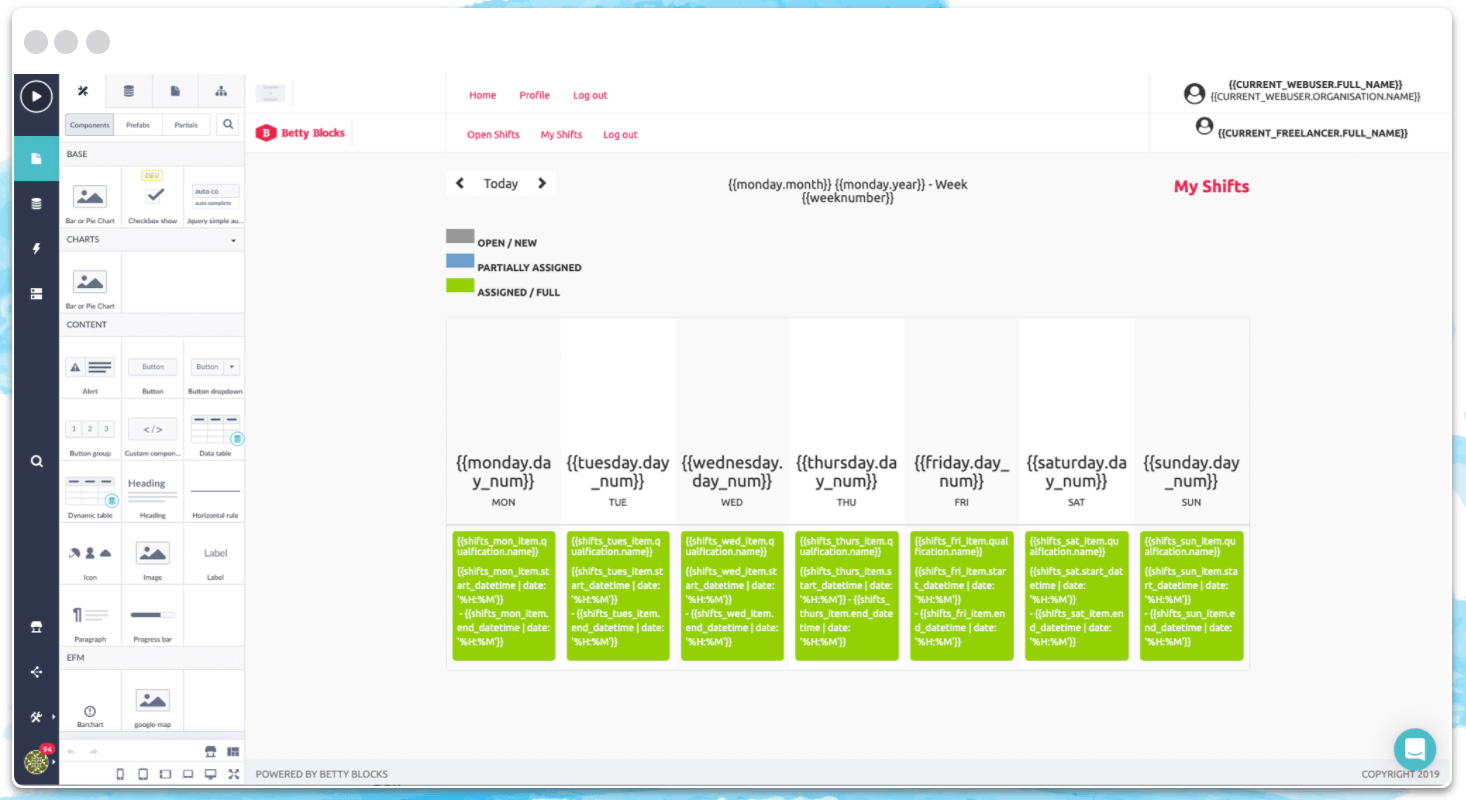
Customizable Templates: Betty Blocks offers pre-made templates and components that are designed to meet the needs of your enterprise’s industry. With Betty Blocks, there is less room for customization and building beautiful apps, but their front-end designs are clean and consistent. Bubble allows for full customization and pixel-perfect placement of any element, which means that you are in charge of enforcing styles. You can also build your Bubble app with templates, which are available for free and for purchase by third-party creators, such as Rapid Dev.
Native App Support: Betty Blocks supports both web and native app development. As of May 2020, Bubble does not yet support native app development, but community members have discovered ways to convert their apps to mobile app stores, with the help of third-party wrappers like Median, Dropsource, or Cordova.
Pricing: Bubble’s starting plan is free to use; production pricing for companies building on Bubble can be either $115 or $475 a month, with all features included and no minimum contract. Betty Blocks’ pricing is based on app structure and requires a 3-year contract.
Betty Blocks Alternatives
Alternative no-code CMS platforms or tools that allow you to build a web application without code include the following tools:
If you’re looking for an alternative no-code platform with an enterprise focus, Unqork and Retool are good options.
If your project is primarily a mobile app, consider using tools like Adalo, Glide, or Thunkable.
If you're building a personal website or a small online business and only need basic landing pages or simple CMS, templated website hosts like Carrd, Squarespace, Wix, or Weebly are good alternatives.
If you are a solo entrepreneur who wants to build their own online business or startup affordably and rapidly, no-code platforms like Bubble are a good alternative to Betty Blocks.
If you want an open-source CMS platform with powerful plugins, and are looking to launch a blog or an e-commerce site, check out WordPress.
About Bubble
Bubble is a leader in the no-code movement. Bubble offers a powerful point-and-click web editor and cloud hosting platform that allows users to build fully customizable web applications and workflows, ranging from simple prototypes to complex marketplaces, SaaS products, and more. Over 400,000 users are currently building and launching businesses on Bubble - some have gone on to participate in top accelerator programs, such as Y Combinator, and even raised $365M in venture funding. Bubble is more than just a product. We are a strong community of builders and entrepreneurs that are united by the belief that everyone should be able to create technology.
Join the no-code movement today.
Disclaimer: The goal of these reviews is to provide an honest, practical, differentiated comparison of features and educate readers on tools in the no-code ecosystem so that you can evaluate how these services fit together and serve your needs.
Build for as long as you want on the Free plan. Only upgrade when you're ready to launch.
Join Bubble
